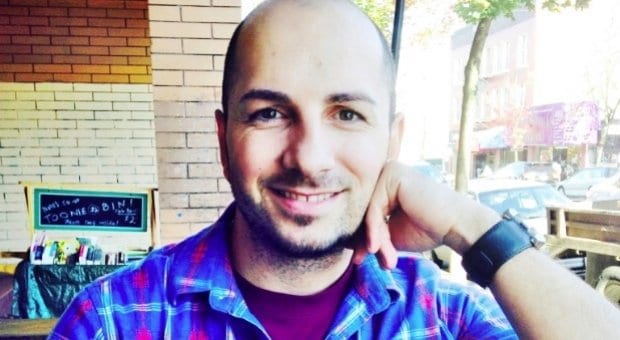The founder of Montenegro’s modern gay movement is seeking asylum in Vancouver, after death threats forced him to flee his home on Sept 11.
“There were just so many death threats that I couldn’t bear it anymore,” says Zdravko Cimbaljevic, who describes himself as the first openly gay man in Montenegro.
“I couldn’t sit down on the bus; people were throwing paper and chewing gum at me. All over the street there were pictures of me with notices saying when I will die and when my funeral will be,” he says. “It was like an obituary.”
Cimbaljevic, who runs the small Balkan country’s LGBT Forum Progress and organized its first Pride event in July, suspects his opponents are members of extremist groups driven by religion, a strict cultural code and ignorance.
He says he ignored the threats initially in the hope that they would dissipate. But the harassment escalated, he says, until he was receiving daily threats through messages on Facebook.
“In 20 days I received more than 200 death threats,” he claims.
“People were writing that they will kill me, they will rip my head off, they will kidnap me and chop my body apart and put my brains in the street,” he says.
“There were many death threats, and they weren’t hiding who they were on Facebook,” he adds. “They were openly threatening to do things to me and the LGBT community.”
Cimbaljecvic says police in Montenegro initially promised to protect him.
“I reported everything,” he says. “At first they responded positively, saying, ‘Don’t worry, everything will be fine.’”
He says police even agreed to meet him at the airport, as a safety measure, when he returned in August from Vancouver, where he was a grand marshal in the Pride parade.
But he says the police never showed up.
“They were not doing anything,” he says. “I was confused.”
He says he eventually received an official police report stating that an investigation into his harassment complaints had determined that his life was not in danger.
“I was really depressed,” he says.
In the weeks following his return from Vancouver Pride, the physical attacks, verbal harassment and death threats became too much for the 30-year-old, who says he became a recluse.
“I actually locked myself in my apartment,” he says. “I realized I could not even go out in the street.”
But, he says, his home wasn’t safe, either. “People were threatening me with Molotov cocktails. They said they knew where I lived and that they would throw it in my first-floor apartment.
“My friends would buy me food and supplies,” he says. “I was hiding from everyone. I didn’t have a private life anymore.”
That’s when Cimbaljevic, with the encouragement of friends, packed up his life in Montenegro, cashed in his air miles and sought sanctuary in Vancouver.
Since his arrival in early September, he has found legal counsel and sought refugee status. He is staying with new friends and says his life has changed dramatically.
“I was really surprised at how the system here works and how Canada is welcoming to people like me who are seeking refuge for their life,” he says. “This would never happen [in Montenegro]. I felt really abandoned as a citizen.”
Chris Morrissey, of Vancouver’s Rainbow Refugee Committee, says she is optimistic that Cimbaljevic will be awarded refugee status.
“He has a very strong case; there’s no question about that,” she says.
The basis of all refugee claims is a “well-founded fear of persecution if they went back to their country,” Morrissey explains.
“We see [claimants] from all different countries,” she says. Some have been stoned or jailed. Others, such as lesbians in traditional Muslim countries, are forced into marriage against their will, imprisoned or gang raped.
“I will never regret that all of this has happened,” Cimbaljevic says. “It has been hard for me, but I know that from today it will be easier for everyone else to come out.
“I did fear for my life. I am human, too, and I was scared,” he says. “But if you have to be an LGBT activist, if you want to be a role model, if you want to be the strength of the community, then you have to be the strongest one so people will follow you.
“I continued my work because I believed what I was doing was the right thing,” he says.
Cimbaljevic’s case is scheduled to go before the Immigration and Refugee Board on Nov 22.
Since Cimbaljevic’s departure, an organization called Queer Montenegro held a police-protected Pride march in the capital city of Podgorica on Oct 20. Although counter-protesters armed with Molotov cocktails and stones attacked police and an estimated 60 people were injured, organizers called the event a success.
Montenegro’s human and minority rights minister, Suad Numanovi, attended. After the march, police had to ferry participants away in vans, for their safety.

 Why you can trust Xtra
Why you can trust Xtra


